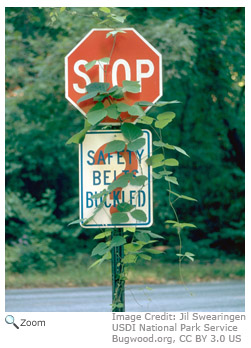Introduction of Exotic Species |
Welcome to the New World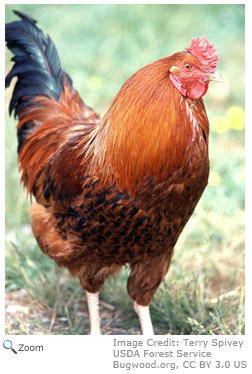 When
colonists came to the New World they brought plants and animals with them. Some, like cats and dogs, were brought as pets. Other animals like cows and chickens were brought for food. These animals are domesticated. That means they are bred to live in close contact with people. When
colonists came to the New World they brought plants and animals with them. Some, like cats and dogs, were brought as pets. Other animals like cows and chickens were brought for food. These animals are domesticated. That means they are bred to live in close contact with people. Other plants and animals that were brought to this country were introduced into wild habitats. Animals like the gray partridge and the brown trout were brought over for hunting and fishing. Animals like pigeons, mute swans, and starlings were brought over because they reminded people of their homeland. Out of Control
| Beauty Turns to Beast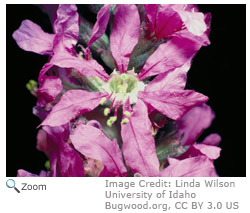 Purple loosestrife was planted in gardens in the U.S. because of its beautiful flowers. The plants adapted to their new home and began growing in the wild and crowding out native wetland plants and wildflowers. One plant the loosestrife drives out is the cattail. Cattails are one of the favorite foods of muskrats. If a pond is taken over by loosestrife, cattails die and muskrats will leave the pond. Purple loosestrife was planted in gardens in the U.S. because of its beautiful flowers. The plants adapted to their new home and began growing in the wild and crowding out native wetland plants and wildflowers. One plant the loosestrife drives out is the cattail. Cattails are one of the favorite foods of muskrats. If a pond is taken over by loosestrife, cattails die and muskrats will leave the pond.
Going Wild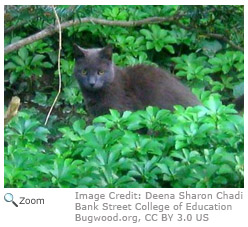 Sometimes domesticated animals like cats, dogs and horses become wild or feral. Feral animals can cause problems for native plants and animals. Some plants in Hawaii are endangered because feral pigs eat them and destroy them by rooting around for food. Feral cats can kill native birds. They are especially dangerous to ground-nesting songbirds. Sometimes domesticated animals like cats, dogs and horses become wild or feral. Feral animals can cause problems for native plants and animals. Some plants in Hawaii are endangered because feral pigs eat them and destroy them by rooting around for food. Feral cats can kill native birds. They are especially dangerous to ground-nesting songbirds.
Big Mistakes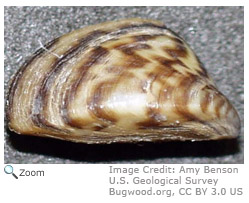 Some exotic species are introduced by accident. The zebra mussel is native to the Balkans. The Balkans are in South Central Europe. It was brought to the U.S. when ships dumped their bilge water. The bilge water contained zebra mussel larvae. The mussels grew and attached themselves to underwater parts of boats. When those boats moved from place to place the mussels colonized the new areas. Zebra mussels cause problems in many lakes and rivers by clogging up water supply pipes. They compete with native animals for zooplankton. Zooplankton are microscopic animals that are an important food source for many organisms. Some exotic species are introduced by accident. The zebra mussel is native to the Balkans. The Balkans are in South Central Europe. It was brought to the U.S. when ships dumped their bilge water. The bilge water contained zebra mussel larvae. The mussels grew and attached themselves to underwater parts of boats. When those boats moved from place to place the mussels colonized the new areas. Zebra mussels cause problems in many lakes and rivers by clogging up water supply pipes. They compete with native animals for zooplankton. Zooplankton are microscopic animals that are an important food source for many organisms.
Images
|

